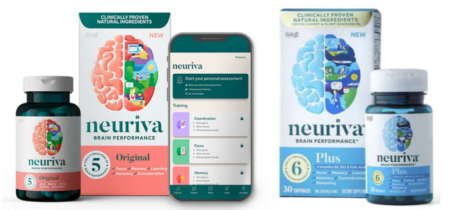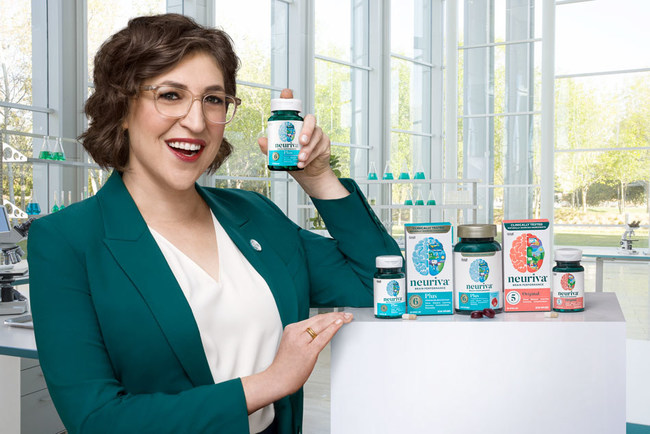An unproven brain supplement, plugged by Jeopardy co-host Mayim Bialik, has started paying it’s customers from the $8 million settlement over false claims that Neuriva is scientifically proven to help brain function.
Customers have until May 2 to file their claims.
Without proof of purchase, customers can claim up to $20 — four purchases at $5 each.
Those with proof of purchase may recover up to $32.50 for each bottle, for a maximum potential award of $65.
Click here to file for your refund.
The Big Bang Theory star and self-acclaimed neuroscientist, put her reputation on the line by personally vouching for the supplement, which a scientist called snake oil.
Bialik is talented and brilliant and she also has a doctorate degree in neuroscience, but never had a career in it.
In her original advertising videos, Bialik said she had “personally vetted” the supplement and found it the best of all so-called brain boosters. She said she was taking it as part of her daily health regimen.
“Neuriva is a key element in Mayim’s brain health routine, along with simple lifestyle choices, like a balanced diet, supplementation, sleep hygiene, physical exercise and an active social life,” the company said in its press releases when she started being the company’s spokesperson.
Her endorsement continued for weeks even after the manufacturer agreed to stop making its fabricated claims. More recently her new television commercials no longer include scientific claims nor of her claiming that she personally researched it.
While denying that it falsely advertised its products, the manufacturer agreed to change its marketing claims. It has agreed to limit its advertising claims to terms such as “clinically tested” and “science tested.”
Under the stipulated agreement signed last April, the company can still make its false claims until six month after a federal judge gives final approval.
The ban on the marketing claims will last for two years. The manufacturer can meanwhile attempt to provide scientific proof of any new claims.
Prevagen Also Made Up False Claims
The Neuriva settlement follows a similar agreement last year between consumers and Quincy Bioscience’s Prevagen products that resulted in the company having to pay out $36 million.
The class action lawsuit claimed that the company falsely claimed that its products are “clinically shown to improve memory.”
The manufacturer is also facing suits from the Federal Trade Commission and the New York Attorney General over false advertising claims.
Yes, I Checked It Myself
“After studying neuroscience for 12 years, I’ve learned a lot about the brain, so anything that can help support the brain is something I’m passionate about,” said Bialik in a company March 16 press release.
“I’m excited to kick off my partnership with Neuriva because I’ve never actually found a brain health supplement I believed in – until now. Neuriva Plus is backed by strong science – yes, I checked it myself – and it combines two clinically tested ingredients that help support six key indicators of brain health.*
“I’m looking forward to educating others about the science behind Neuriva because supplements are truly not all created equally. My hope is to inspire others to do more for their brain through a holistic approach and incorporate Neuriva into their daily health routine, just like it’s become part of mine.”
In her May 6 commercial, she still insisted it was “backed by real science.”
In her research, she might have overlooked a March 27, 2020 article in Psychology Today by Gary L. Wenk, Ph.D. Author of Your Brain on Food.
He called it snake oil
“Move over sellers of last year’s miracle brain enhancer, Prevagen, there’s a new snake oil salesman in town. Neuriva is all the rage now thanks to slick marketing campaigns by Schiff Vitamins who have made lots of money selling other useless products, such as Airborne,” he wrote.
Gary L. Wenk, Ph.D., is a professor of psychology, neuroscience, molecular virology, immunology and medical genetics at the Ohio State University.
About Neuriva
Named from the Greek word for ‘Brain’ and the Latin word for ‘Life,’ Neuriva combines the best of science and nature to help brains think bigger. Neuriva is more than a supplement; it’s a brain-healthy lifestyle. Its holistic approach incorporates an ecosystem of digital assessments, brain-sharpening exercises and education. When they created Neuriva, they thought bigger so you can too.”

Eat Berries Instead
Instead of paying $65 a month to be part of the $4 billion market for bogus brain supplements, eat berries.
Consumer Reports suggests a cup of berries a day will improve your memory and overall health. If fresh berries are out of season you can buy them frozen.
“Blueberries, strawberries, and raspberries are also powerful foods for learning and memory, says Barbara Shukitt-Hale, PhD, a neuroscientist at the Jean Mayer USDA Human Nutrition Research Center on Aging at Tufts University in Boston.
“According to a 20-year Harvard study of women 70 and older, eating blueberries at least once a week or strawberries at least twice a week may delay cognitive aging by up to two-and-a-half years. And in Shukitt-Hale’s research, older men and women who ate the equivalent of 1 cup of fresh blueberries every day for three months did better on learning and memory tests than those who were given a placebo. Ongoing research suggests that strawberries and raspberries may have similar benefits, she says.”



Quincy Bioscience’s Prevagen products resulted in the company having to pay out $36 million.
Without proof of some benefit, why is it still heavily marketed ?
Seems to me that the FDA has its hands tied when attempting to determine the effectiveness or suitability of supplements.
See this Wired Magazine piece for some further information.
https://www.wired.com/story/prevagen-made-millions-fda-questioned-safety/
The FDA does not check the efficacy of the hundreds of supplements being sold. The only issue the government and class action lawyers can challenge is false claims. And in each supplement there were false claims of scientific proof of efficacy.